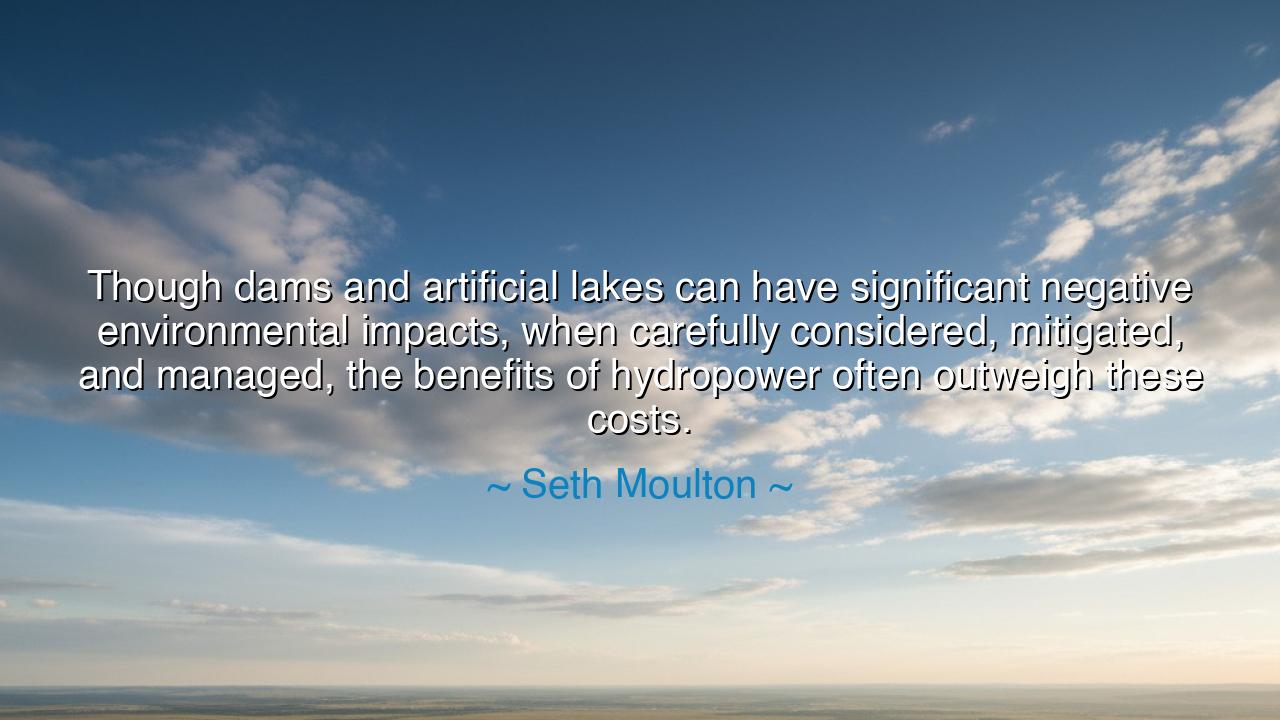
Though dams and artificial lakes can have significant negative
Though dams and artificial lakes can have significant negative environmental impacts, when carefully considered, mitigated, and managed, the benefits of hydropower often outweigh these costs.






Hear the words of Seth Moulton, who speaks of balance, sacrifice, and wisdom: “Though dams and artificial lakes can have significant negative environmental impacts, when carefully considered, mitigated, and managed, the benefits of hydropower often outweigh these costs.” In this saying, we find not only the struggle of engineers and statesmen, but the eternal dilemma of humankind: how to harness the forces of nature for the good of many without destroying the very earth that sustains us. It is a call to wisdom, a reminder that power and responsibility are bound together, as the river is bound to its banks.
The heart of his words lies in hydropower—the ancient power of water, turned by human hands into energy. Since the dawn of civilization, rivers have been both friend and foe: flooding fields yet feeding them, destroying villages yet nourishing life. To dam a river is to master part of its might, to turn the eternal flow into light, warmth, and growth for countless homes. Yet Moulton does not deny the shadow: environmental impacts—forests drowned, animals displaced, soils changed, waters altered. To wield this tool is to risk harm even as we seek benefit.
History gives us many mirrors of this truth. Consider the Hoover Dam, rising from the desert of the American West, a monument of human ambition. It tamed the Colorado River, bringing electricity, irrigation, and hope to millions. Cities flourished where once only barren earth lay. Yet behind its triumph lay valleys submerged, communities uprooted, ecosystems changed forever. The Hoover Dam stands as both a beacon of progress and a reminder of cost. In its story, we see exactly what Moulton teaches: that such works must be carefully considered, mitigated, and managed, lest the price outweigh the gain.
The ancients would have understood this struggle well. They spoke often of hubris—the arrogance of men who believed they could master the gods or the earth without consequence. But they also praised prudence, the virtue of those who weighed each decision with foresight and humility. Moulton’s words are born of this ancient wisdom: progress is not evil, nor is caution weakness. Only when the two walk hand in hand—boldness with restraint, power with stewardship—can humanity thrive without tearing its roots from the soil.
To say that the benefits outweigh the costs is not to dismiss the damage, but to remind us that energy is life. Without it, cities darken, hospitals falter, families suffer in cold and hunger. Hydropower, when wisely governed, offers a source of energy clean and renewable, sparing the skies the smoke of coal and the seas the oil of industry. Yet if pursued recklessly, it may poison the very earth it seeks to save. Thus, the challenge is not whether we use it, but how we use it—with foresight, compassion, and constant care.
The lesson is clear: embrace progress, but never without responsibility. Every dam must be judged not only by its power output, but by the lives and lands it alters. Every artificial lake must be weighed not only in numbers, but in the voices of the people and creatures who once lived where waters now rise. To honor the earth is to measure carefully, to act with humility, and to mitigate the harm where harm cannot be avoided.
Practical actions spring forth. Support energy projects that listen to science, communities, and the environment alike. Demand that leaders balance ambition with wisdom, and that they invest in ways to soften the blow of progress. As individuals, conserve energy, cherish water, and honor the natural world. And above all, let us remember that in all things—whether rivers or laws, whether progress or tradition—balance is the truest path.
Thus, Moulton’s words echo like the sound of a river against stone: a reminder that power is never free, that progress carries a cost, and that only wisdom can decide whether the price is worth the reward. Let us be guardians, not merely builders, so that our children may inherit not only cities of light, but also rivers that still sing.






AAdministratorAdministrator
Welcome, honored guests. Please leave a comment, we will respond soon